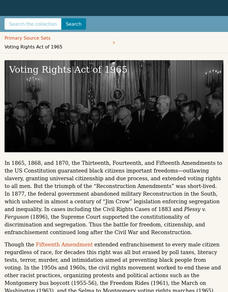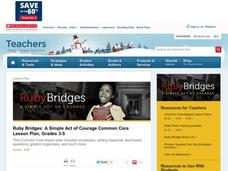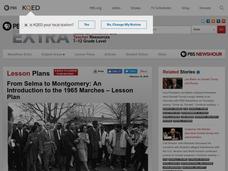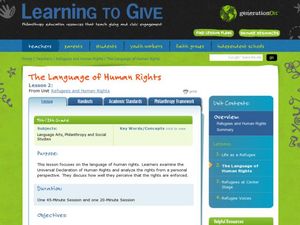Stanford University
Civil Rights or Human Rights?
Young citizens consider the American civil rights movement as part of the global struggle for human rights. After using a timeline activity to learn about the major events in the civil rights movement, class members study Malcolm X's...
Civil Rights 50
Civil Rights at 50
The 50th anniversary of the 1963 March on Washington, President Johnson's signing of the Civil Rights Act of 1964, the Voting Rights Act of 1965, and the Immigration and Nationality Act of 1965 provide the backdrop for a series of lesson...
iCivics
The Road to Civil Rights
Here is a fantastic resource on the civil rights movement! It includes reading materials and worksheets, and particularly highlights major legislation and the role of the judicial branch in the federal government in addressing the...
PBS
Martin Luther King Jr.: Civil Rights Leader
Expand class members' appreciation of the work of Dr. Martin Luther King, Jr. A powerful resource examines King's speeches, writings, and actions that reveal his deep commitment to a nonviolent approach to Civil Rights. Learners watch a...
Newseum
Civil Rights: Identifying Community Issues
As part of the social, economic, and legal/political civil rights study, class members brainstorm a list of current civil rights issues that affect their community. Individuals or pairs select one issue to research further. The class...
City University of New York
Jim Crow and the Fight for Civil Rights
The history of voting rights in America has always been rocky, especially in the time period after the Civil War. Learn about the ways that Jim Crow laws affected the voting rights of African Americans with a lesson featuring primary...
Digital Public Library of America
Voting Rights Act of 1965
Despite the passing of the Thirteenth, Fourteenth, and Fifteenth Amendments, as well as the passing of the Voting Rights Act of 1965, the struggle to ensure fair voter registration and election procedures continues. Young historians...
Mr. Beem's Social Studies
Civil Rights Project: The Long Civil Rights Movement
Investigate milestones along the path that lead to the American Civil Rights Movement of the 1960s. After researching key people, events, court cases, and legislative orders, teams present their findings as a magazine, newspaper, or...
US National Archives
Documented Rights Educational Lesson Plan
How have groups struggled to have their unalienable rights recognized in the United States? Acting as a research team for the Human Rights Council of the United Nations, your young historians will break into groups to research how people...
C3 Teachers
Civil Rights: What Made Nonviolent Protest Effective during the Civil Rights Movement?
Sit-ins and boycotts, marches and speeches, songs and demonstrations were hallmarks of nonviolent protest of the civil rights movement. Young scholars research primary and secondary source documents to determine what made nonviolent...
Newseum
Civil Rights: The Five Freedoms
After a close reading of the First Amendment and the five freedoms it guarantees, class members examine the civil rights timeline to see how civil rights groups applied these freedoms to create change. Using the issue the class chose in...
K20 LEARN
Forgotten Figures: The Civil Rights Movement
Most have heard of Dr. Martin Luther King, Malcolm X, and Rosa Parks, but few recall Elizabeth Jennings, Samuel W. Tucker, or Ada Lois Sipuel Fisher. Young historians research and then develop a presentation about the contributions of...
Anti-Defamation League
Martin Luther King, Jr. and Civil Rights
How far have we come and how far do we still need to go to achieve equality and full civil rights in the United States? Include a packet of materials collected in your observance of Martin Luther King, Jr. Day.
Scholastic
Ruby Bridges: A Simple Act of Courage, Grades K-2
A civil rights movement lesson designed specifically with the Common Core State Standards in mind, young learners are introduced to the story of Ruby Bridges as the first African American child to attend an all-white elementary school....
Scholastic
Ruby Bridges: A Simple Act of Courage, Grades 3-5
Through character trait graphic organizers, a vocabulary sorting activity, class discussion, and a civil rights movement slide show, your young historians will be introduced to the amazing story of Ruby Bridges and her experiences as the...
Albert Shanker Institute
Heart of the Matter
Most people have heard of Dr. Martin Luther King, Jr. and his famous "I Have a Dream" speech, but few have heard of Philip Randolph and Bayard Rustin. Who were these guys and what did they have to do with this famous landmark event in...
PBS
From Selma to Montgomery: An Introduction to the 1965 Marches
The 1965 Civil Rights marches from Selma to Montgomery and the resulting Voting Rights Act of 1965 are the focus of a social studies lesson plan. The resource uses film clips to inform viewers not only about the discrimination that gave...
K20 LEARN
Government and Your Right To Vote: Voting Rights In America
Gaining voting rights was difficult over the course of decades, but the debate over who should actually be allowed to cast a ballot remains. Scholars explore the history of the struggle, including the fifteenth and nineteenth amendments,...
Atlanta History Center
Civil Disobedience and the Atlanta Student Movement
What tactics are used in civil disobedience? Learners study the conditions in Alabama that led to the establishment of the Atlanta Student Movement, as well as consider the nature and effectiveness of civil disobedience.
C-SPAN
Last Days of Martin Luther King, Jr.
On April 4, 1968, Dr. Martin Luther King, Jr. was assassinated in Memphis, Tennessee. Four video clips reveal the events of that time, including the shift in the focus of the Civil Rights Movement, the aftermath of the assassination, and...
Alabama Department of Archives and History
The Wrong Side of History: How One Group Justified Its Opposition on the Freedom Riders and Civil Rights for African Americans
Designed as a supplement to the study of the Freedom Riders, this resource uses primary sources to reveal the views of those who opposed the Freedom Riders. After careful study of the arguments presented by the members of the Montgomery...
Curated OER
The Language of Human Rights
Did you know that there are 15.2 million refugees in the world? High schoolers will read "The Universal Declaration of Human Rights" and learn how they can get involved to lower this surprising number. To really encourage involvement,...
West Virginia Department of Education
An Act Worthy of Reward
John Brown is considered by many to be a martyr for abolition and civil rights. The resource covers an important event in West Virginian history, the raid by John Brown, as a standalone that discusses Brown's last words and his reaction...
Stanford University
Lesson Plan: The Children's Crusade and the Role of Youth in the African American Freedom Struggle
Young people played significant roles in the Civil Rights movement. Class members examine the contributions of Barbara Johns, Claudette Colvin, Mary Louise Smith, and the children of Birmingham,...
Other popular searches
- Civil Rights Act 1964
- Civil Rights Act of 1964
- Civil Rights Activism
- Civil Rights Act 2001
- Civil Rights Act Canada
- Civil Rights Act 1965
- Civil Rights Act 1866
- Civil Rights Act 1968
- Civil Rights Activists
- Civil Rights Act of 1866
- Jewish Civil Rights Activists
- Civil Rights Activities

























